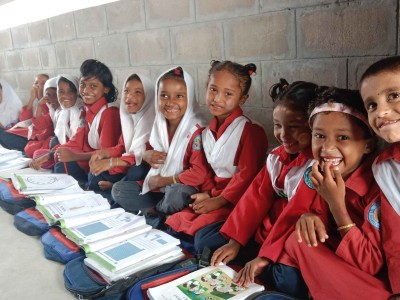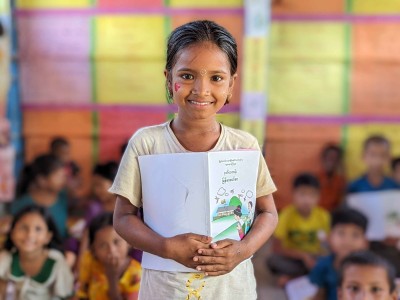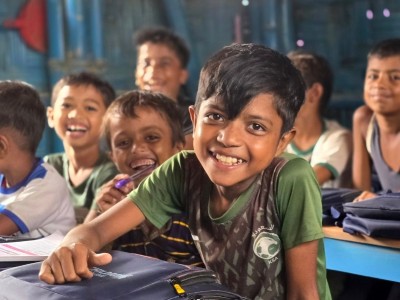1. Policy Statement
1.1 Children on the Edge is a child rights organisation created to support the world’s most marginalised children. We currently work with more than 15,500 children in Bangladesh, India, Uganda, Myanmar, and Afghanistan.
Over 35 years of experience in more than 18 countries have enabled us to work alongside communities to design programmes that address their specific needs and circumstances. By doing so, we help transform the lives of marginalised children by co-creating protective, nurturing environments in which they can safely live, play, learn, and thrive.
1.2 With equity, diversity and inclusion forming our values, we consistently listen, respond and adapt in rapidly changing environments. The principles of inclusiveness, tolerance and fairness are key to the way we work.
1.3 This policy exists to ensure equitable access to the employment opportunities and working practices at our UK Head Office. It is also the basis for which we engage and work with our international project partners.
1.4 We will not accept unfair discrimination or less favourable treatment on the grounds of race, ethnicity, class, caste, sex, gender, sexual orientation, age, religion or belief, immigration status, disability, marriage and civil partnership, gender reassignment, pregnancy and maternity or trade union activity (see section 6 for definitions) as an employer or in the running of our organisation.
1.5 This policy is fully supported by COTE’s Board of Trustees, Directors and senior management team who have given clear direction and leadership that promoting equality is a priority.
2. Policy Aims
2.1 The aim of this policy is to create an organisation where:
Staff understand that COTE is about inclusivity and that’s modelled in actions.
Every adult and child involved is able to give of their best.
Decisions are fair and based on merit, competence and potential.
In our work we take account of individuals’ experiences and needs.
Unfair discrimination is not tolerated.
2.2 We understand that to do this we will need to address the root causes and impacts of stereotyping, prejudice, discrimination, harassment and victimisation, as well as examine and interrogate the indirect discrimination that can unintentionally arise from our policies, practices and procedures, ie that they may apply to everyone in the same way so appear to be fair, but they have a worse effect on some people than others.
2.3 Through this policy we also aim to:
Attract and retain staff, partners, volunteers, Board members and donors that reflect the diverse communities in which we operate and who are committed to our equality principles.
Build an organisational culture that is tolerant, open and inclusive and where people feel safe, where differences are accepted, engagement is apparent and the contributions of all are encouraged, valued and respected.
Mainstream equality into every aspect of our work including employment, fundraising, campaigning, marketing and events so that we can meet the needs of all our stakeholders.
3. Policy Implementation
3.1 In order to translate this policy into action we will:
Train our staff to carry out this policy and embed equality principles into all relevant training including induction.
Communicate this policy to all our stakeholders so that they are aware of our commitment to treat them fairly and their obligation to operate in line with this policy.
Take appropriate action when incidents occur which breach this policy (see section 7).
Level the playing field for people with disabilities through the provision of reasonable adjustments.
Regularly monitor and review the success of this policy in promoting equality and evaluate its relevance and effectiveness.
4. Our Legal Duties
4.1 The Equality Act 2010 replaced a number of existing anti-discrimination laws to simplify and strengthen equality law, removing inconsistencies and making it easier for people to understand and comply.
4.2 This policy is the instrument through which we comply with our obligations as an employer as set out in the Act. As such all our stakeholders need to understand the protections and obligations conferred on them by the Act.
4.3 The purpose of the Act is that everyone has the right to be treated fairly at work. It protects people from discrimination by employers and service providers on the basis of nine protected characteristics:
Age
Disability
Gender reassignment
Marriage and civil partnership
Pregnancy and maternity
Race
Religion or belief
Sex
Gender
Sexual orientation
4.4 The Equality Act protects our staff, volunteers, Board members and donors against:
Direct discrimination: This occurs where, because of a protected characteristic, a person receives worse treatment than someone who does not have that characteristic. For example, an employee is turned down for a job because their manager believes that their sexual orientation will prevent them gaining their team’s respect. However, different treatment because of age is not unlawful direct or indirect discrimination if you can justify it, i.e. if you can demonstrate that it is a proportionate means of meeting a legitimate aim. Age is the only protected characteristic that allows employers to justify direct discrimination.
Discrimination by association: This is discrimination against someone because they associate with another person who possesses a protected characteristic. For example, a man is treated less favourably at an event because of his friendship with an individual who is transgender.
Perception discrimination: This is discrimination against an individual because others think (incorrectly) that they possess a protected characteristic. For example, an employee is not offered the chance to represent her company at a major event because her line manager believes she has mental health issues.
Indirect discrimination: This occurs when there is a policy or a practice that applies to everyone but which particularly disadvantages people with a protected characteristic compared with people who do not have that characteristic. For example, including unnecessary criteria in a person specification that could increase the barriers for those with certain characteristics to applying.
Harassment: This is unwanted conduct related to a protected characteristic, which has the purpose or effect of violating an individual’s dignity or creating an intimidating, hostile, degrading, humiliating or offensive environment for that individual.
Victimisation: This occurs when a person is treated less favourably than someone else because they have complained about discrimination, or are suspected of doing so or have supported someone else who has.
4.5 People are specifically protected against discrimination ‘arising from disability’. For example, they would be protected from an employer penalising them from taking regular comfort breaks to manage chronic pain when they would reasonably be expected to know that the employee has a disability. This type of discrimination is only justifiable if an employer can show that it is a proportionate means of achieving a legitimate aim.
4.6 People with disabilities also have a legal right to reasonable adjustments from their service provider or employer. For example, through the provision of specific software, furniture or lighting.
4.7 A person is protected against discrimination on the grounds of pregnancy during the period of the pregnancy and postnatal period, and any statutory maternity leave to which they are entitled. For more information see COTE's maternity policy.
4.8 Finally, it would be discrimination to treat transgender people less favourably for being absent from work because they are undergoing gender reassignment than they would be treated if they were absent because they were ill or injured.
We expect our staff, volunteers and Board members to behave in accordance with the above provisions.
We will make our commitment to equality clear in our working with partners and donors.
5. Definitions and Further Explanations
This policy is based on the following definitions and explanations.
Disability: is defined by the Equality Act as a physical or mental impairment that has a substantial and long-term adverse effect on ability to carry out normal day-to-day activities. Long-term means has lasted, or is expected to last, for 12 months. Included in this definition are:
Physical impairments (including asthma, diabetes, epilepsy etc).
Sensory impairments such as hearing impairment or visual impairment.
Severe facial disfigurement.
Progressive conditions such as cancer, multiple sclerosis or HIV infection.
People who have had impairment in the past but have since recovered (such as cancer, mental health issues).
COTE supports the social model of disability that states that disability is created by society’s barriers and not by particular medical conditions or impairments. Removing these barriers, which disable people who have impairments, can therefore reduce disability.
Barriers can be:
Prejudice and stereotypes
Inflexible organisational procedures and practices
Inaccessible information
Inaccessible building
Inaccessible transport.
Diversity: is used to describe the process of valuing differences in individuals’ attitudes, cultural perspectives, beliefs, ethnic background, sexuality, skills, knowledge and life experiences. Diversity recognises and celebrates difference as something which is positive and beneficial to us all.
Equality: is about making sure that people are treated fairly and given equitable opportunities. It is not about treating everyone the same. Achieving equality of outcomes means meeting different needs in different ways. When mentioned in policies the word equality usually implies a focus on those characteristics covered by legislation.
Equity: This means achieving equality of outcomes and opportunities by catering to different people’s needs, ie addressing inequality of access due to disability, gender, ethnicity, sexuality, caste, religion or any other identifier. For example, equity of access to the workplace might mean providing disability aids for those who need them, or recruiting and training illiterate women in regions where men have higher literacy rates.
Gay/Lesbian: romantically and sexually attracted to people of the same gender. The term ‘gay’ is most commonly applied to men and ‘lesbian’ usually applied to women.
Gender: the socially constructed characteristics (roles, behaviours, activities and attributes) that a given society considers appropriate for girls, boys, men and women.
Gender Mainstreaming: means ensuring that women’s and men’s and people of other genders’ concerns and experiences are integrated into the design, implementation, monitoring and evaluation of our strategies, policies, programmes, projects and workplace culture. The aim of gender mainstreaming is gender equality; an outcome where everyone’s rights and needs are recognised and addressed.
Gender Reassignment: a person who is proposing to undergo, is undergoing or has undergone a process to change their sex. To qualify for protection from discrimination a transsexual person does not have to show that they are under medical supervision.
Homosexual: a more official term for people who are sexually and romantically attracted to members of the same sex. Not so commonly used by lesbian or gay people to describe themselves.
LGBTQI+: stands for Lesbian, Gay, Bisexual, Transexual, Queer/Questioning, Intersex plus… Meaning anyone not identifying as cisgender heterosexual. It is an inclusive term used so that people can identify as a member of the LGBTQI+ community without having to explain their individual gender identity, sex or sexual orientation. (Cisgender means that gender identity matches the binary male or female sex assigned at birth.)
Mainstreaming: the seamless integration of equalities issues into the policy making and service delivery process – planning, development, implementation and evaluation. And a way to ensure that promoting equality is not reliant on the commitment of a few individuals but part and parcel of our everyday business.
Monitoring: for equality data to check if people with protected characteristics are participating and being treated equally. For example, monitoring the representation of women or disabled people in the workforce or at senior levels within organisations.
Positive Action: a range of lawful actions that seek to overcome or minimise disadvantages (e.g. in employment opportunities) that people who share a protected characteristic have experienced, or to meet their different needs.
Positive Discrimination: Treating someone with a protected characteristic more favourably to counteract the effects of past discrimination. It is generally not lawful although the duty to make reasonable adjustments is an exception where treating a person with disabilities more favourably may be required by law.
Race: Refers to the protected characteristic of race. It refers to a group of people defined by their race, colour, nationality (including citizenship) ethnic or national origins. It includes Anglo-Roma Gypsies, Irish, Scottish and Welsh Travellers.
Reasonable Adjustment: Where a person is at a substantial disadvantage due to their disabilities in comparison with people who do not have those disabilities, there is a duty to take reasonable steps to remove that disadvantage by (i) changing provisions, criteria or practices, (ii) altering, removing or providing a reasonable alternative means of avoiding physical features and (iii) providing auxiliary aids.
Religion or Belief: includes any religion and lack of religion, in other words individuals are protected if they do not follow a certain religion or have no religion at all. Additionally, a religion must have a clear structure and belief system. Belief means any religious or philosophical belief or a lack of such belief. To be protected, a belief must satisfy various criteria, including that it is a weighty and substantial aspect of human life and behaviour.
Sex: the categories female, male and intersex that people fall into according to biologically determined sex characteristics (primary and secondary sex characteristics including external and internal genitalia, hormones and chromosomes).
Sexual Orientation: Whether a person's sexual attraction is towards their own gender (homosexual), other genders (heterosexual, bisexual and pansexual), or don’t experience sexual attraction (asexual).
Stereotyping: making assumptions about an individual or group based on a particular attribute.
Transsexual Person: a person who has the protected characteristic of gender reassignment. This may be a woman who has transitioned or is transitioning to be a man, or a man who has transitioned or is transitioning to be a woman. The law does not require a person to undergo a medical procedure to be recognised as a transsexual.
6. Roles and Responsibilities
6.1 COTE Board’s responsibility is to:
Own and monitor implementation of this policy.
6.2 COTE Directors’ responsibility is to:
Take responsibility for delivery of this policy.
Provide strong leadership on equality.
Work closely with the Board of Trustees to monitor and review the policy and its implementation.
6.3 COTE Senior Management and Leadership Team’s responsibility is to:
Act as equality champions and role models.
Implement this policy and integrate equality into the work of COTE.
Ensure that staff are aware of this policy and understand their rights and responsibilities contained within it.
Allocate their time and support and any training or development opportunities objectively, fairly and without discrimination.
Communicate regularly with their teams about equality issues in a way that keeps this policy central to how we work.
Respond to allegations of discrimination and harassment fairly, quickly and effectively.
6.4 COTE HR Manager's responsibility is to:
Provide equality induction and training at point of recruitment, and refreshers when appropriate.
Investigate and deal promptly with any incidents or individual behaviours that contravene this policy.
6.5 All COTE staff have a responsibility to:
Treat others with dignity and respect.
Report discrimination, bullying, unfair treatment or harassment that they experience or witness.
Help identify discriminatory practices or procedures and bring these to the attention of their line managers or the Ops/HR Manager.
Contribute to creating an inclusive learning environment that values difference.
Attend mandatory staff training and development events.
Express opinions constructively with sensitivity and respect.
7. Monitoring and Evaluation
7.1 Ultimate responsibility for monitoring the implementation of this policy rests with the COTE Directors. However each and every individual involved in COTE needs to play their part in translating policy into practice.
7.2 On a day-to-day basis breaches of this policy could occur at a number of levels, some requiring a more urgent response than others.
7.3 If staff or volunteers find examples of indirect discrimination in COTE policies and procedures they should bring this to the attention of their line manager and the Ops/HR Manager. They can then consider the issue and respond as appropriate.
7.4 Should staff or volunteers experience or witness more severe breaches of this policy, perhaps involving direct discrimination against an individual or bullying and harassment then they have a number of options including:
Speaking to the individual(s) involved
Contacting the Ops/HR Manager
Talking to their line manager
Whichever option is chosen, staff and volunteers are strongly encouraged to take action. Cases of this nature will then most likely be dealt with through COTE's grievance, disciplinary, whistleblowing policies.
7.5 We will take action where needed to address any inequalities that are surfaced through the implementation of this policy.
7.6 A formal biennial review of the policy will be led by the Ops/HR Manager, and agreed by the Directors for reporting to the Board. The review will focus on tracking progress, identifying challenges to delivery and devising ways to overcome these as well as checking that the policy aims and actions remain relevant.
Policy Adopted in: Feb 2022
Revised: Feb 2024



